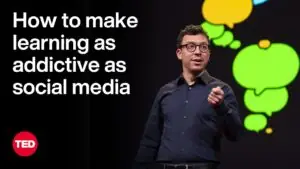The journey of learning a new language is filled with exhilaration and moments of self-doubt. As learners go through this journey, they often find themselves at crossroads, debating the effectiveness of modern tools and age-old methods. Redditors, as always, have something to say on the matter.

✅ AI Essay Writer ✅ AI Detector ✅ Plagchecker ✅ Paraphraser
✅ Summarizer ✅ Citation Generator
Key Takeaways:
- Despite them being perceived as “boring”, mastering the fundamentals like grammar is essential for effective communication in a new language.
- While language learning apps like Duolingo offer a structured path, nothing can replace the experience and benefits of talking directly with native speakers.
- Immersing oneself fully in the target language can be overwhelming initially. Sometimes, explanations in one’s native language can clarify concepts faster and provide a strong foundation for future learning.
Diving into a new language is a bit like setting off on an exciting, yet sometimes challenging, journey. The thrill is in discovering new cultures, unlocking stories from other parts of the world, and gaining a fresh perspective. But the road to it? That can be filled with a few bumps.
One of the users on the subreddit “r/languagelearning” decided to stir up the pot and ask other users for their “hot takes” when it comes to the process of learning a new language. Obviously, the road to success is built very differently among many people, so the author of the original question got wondering.
So, what are the controversial (or not-so) opinions of language learners around the world? Let’s see for ourselves.
Lack of Motivation, Pronunciation Issues, Boring Tasks – Common Challenges for New Learners
A common concern for learners is the fear of making errors. Mispronouncing a word or getting a sentence structure wrong is part of the process, but it can feel daunting. These small hiccups might make someone hesitant to jump into conversations. Everyone’s learning journey is unique. Some might grasp reading quickly but struggle a bit with speaking. Factors like age, learning methods, and even the learner’s environment can influence their progress.
Despite the hurdles, the process of learning a new language is deeply enriching. Each new word learned or conversation held feels like an achievement. It’s not just about collecting vocabulary; it’s about broadening horizons and forming new connections. The path may be demanding at times, but the rewards are plenty, as most Reddit users under the post agree. The only problem is how do you start?
“Don’t focus on the best method. Comprehensible input, grammar tables, courses, italki. Just start.”
Starting the journey of language learning without set goals can feel like setting off on a road trip without a clear destination. The idea is enticing, the promise of new experiences and cultural connections. Yet, without a roadmap, the path can become puzzling and meandering. Moreover, without defined milestones, tracking your progress becomes extremely challenging. Sure, one might pick up a handful of phrases, but they could be missing the deeper layers of the language and the cultural stories it tells. For example, Fluent has summarized all of the common intentions when learning a language and put it into two groups: visual goals and path goals. Both require some specific ways of building your strategy and focus on separate issues. It’s absolutely necessary to understand what you want to get out of this experience and you have to approach your language journey with a certain mindset. The commenters under the thread highly agree, saying that tailoring your learning journey to specific needs and goals is practically having one foot through the door.
“Having a clear reason for learning a language is not only a powerful tool in maintaining motivation, but also helps to learn more efficiently by focusing on the specific vocabulary and language structures needed to achieve the type of fluency you want.”
Every language has its distinct sounds, rules, and words. Learners have to adapt, trying to pronounce unfamiliar sounds or remembering unique grammar structures. Culture adds another twist. Some phrases or expressions in one language may not have a direct translation in another because they’re closely tied to a place’s history or way of life. To really “get” a language, understanding its culture is key. One of the Redditors shared the same sentiment, stressing the fact that learning a language should be fun, first and foremost.
“Having fun while learning a language is more important than using the most effective method possible. If language learning is your hobby, you should be enjoying the process instead of feeling or even being pressured to use a certain method you might not enjoy just because it happens to be more effective. And others who enjoy language learning shouldn’t shame other learners for using a different method they enjoy more either.”
While having an accent reflects one’s linguistic background and is never something to be ashamed of, striving for accurate pronunciation in a language you’re learning can be much more beneficial. Good pronunciation ensures that the message is conveyed as intended, with no chances of misunderstandings. It aids in better comprehension among native speakers, fostering smoother interactions and building confidence in the learner. One user shared a story of one of their friends who tried very hard to intelligibly speak Spanish.
“Pronunciation matters. I’m not advocating for a native speaker model, but it’s important to put in the work on your pronunciation so that listeners can understand you more easily. To illustrate, I knew someone (native English speaker) who was decently fluent in Spanish but natives would sometimes switch to English when having conversations with her because they couldn’t understand her. It upset her. But it was because she pronounced didn’t try to change any of her phonemes or intonation patterns when speaking Spanish, and sometimes it was simply too much strain for listeners.”
By focusing on correct pronunciation, learners immerse themselves more deeply into the culture and rhythm of the language, often leading to a more profound connection and understanding. It’s not about erasing one’s roots or linguistic history, but rather about enhancing the clarity and effectiveness of cross-cultural communication.
More Controversial Takes on Learning Differences Come Into the Picture
One of the less popular but somewhat triggering takes centers around all of the boring language basics being actually extremely useful. When the excitement finally wears off, many students start to wonder: is it really that necessary for me to remember all of those boring paragraphs and grammar rules? Well, the answer is yes.
Just as a house needs a solid foundation to stand tall, language learners require a grasp of the basics to communicate effectively. Grammar, for instance, is the structural backbone of any language. Moreover, it’s challenging to participate in conversations if you’re constantly second-guessing your word choices or sentence construction. By mastering the basics, learners gain the confidence to engage in dialogues, ask questions, and share stories without hesitation. Once the basics are firmly in place, advancing to more complex aspects of the language becomes significantly smoother. Think of it as climbing a ladder; with each step you take it gets easier to reach the top. Some Redditors agree with the fact that completely disregarding so-called “boring” aspects of language is completely the wrong way to approach it.
“There’s some anti-intellectualism in the language learning community that really irks me. Especially a couple of so called YouTube polyglots. They seem to be straight up allergic to textbooks and academic study. LeARn lIKe a BaBY. Don’T StuDy GrAMmar. Muh. I seriously wonder if these people have ever studied anything in their lives.”
Often, in the sphere of language acquisition, there’s a prevalent notion, especially among individualists, that every person has a unique way of learning. However, while personal preferences and motivations can differ, the fundamental process of language learning is quite similar across the human spectrum. Here’s the catch: We might be drawn to activities we find enjoyable or motivating in our quest to master a new language. These preferences often stem from our personal experiences and tastes. Some might lean towards interactive apps, while some might find comfort in traditional classroom settings.
However, these preferences should not be mistaken for the essence of effective language learning. Many tried-and-true methods, often dubbed “boring” by learners seeking quick fixes or entertaining avenues, remain indispensable. Rigorous grammar exercises, repetitive vocabulary drills, and structured lessons have stood the test of time not because they are fun, but because they lay a foundational understanding of the language’s ins and outs. One of the commenters couldn’t agree more:
“Individualists like to say everyone learns differently, but decades of SLA research indicates that the underlying process is fundamentally the same for humans in general, and the only real individual differences are the activities you prefer/enjoy/are motivated to do to consume your target language.”
This is especially relevant when it comes to the discussion of the necessity of writing exercises. A common scientific argument for cultivating writing as a method of language learning is its profound impact on the brain. Handwriting activates the Reticular Activating System (RAS), known as a key region associated with memory. While speaking provides immediate feedback and listening enhances comprehension, it’s through writing that learners can truly remember the necessary concepts. Writing demands reflection and precision; it allows learners to organize their thoughts, grapple with new grammar structures, and experiment with vocabulary at their own pace. As they write, they see the language laid out before them, which aids in recognizing patterns and cementing their understanding. Moreover, revisiting past written pieces can highlight how much they’ve grown in fluency and competence.

There’s a trendy belief in language education circles that immersing oneself fully in the target language, even during lessons, leads to quicker learning. The idea is that if you’re surrounded by a new language without the crutch of your native tongue, you’ll pick it up faster. However, this might not be the golden rule it’s often presented to be. Explanations given in the target language completely can demotivate students with beginner levels, complicate the process (since you can’t really explain assignments in more detail), and even lack interpersonal support from the educator. One of the users had that exact problem that was quickly figured out when they switched to their native language in the process.
“Learning your target language in your target language is not going to teach you as well as learning it in your native language. When I was learning French, I would often miss some very basic concepts because I just didn’t understand the way my teacher described it in French. There was a concept I didn’t get and I used it wrong for years. Once it was clearly described to me in English, I never forgot it again.”
Over time, as learners gain confidence and familiarity, transitioning to exclusive communication in the target language can be beneficial. But in the initial stages, when everything is new and potentially overwhelming, occasional guidance in the native language can be a saving grace.
Are Apps Like Duolingo Really That Helpful?
In today’s digitized age, language learning apps like Duolingo have taken the educational world by storm. Their gamified approach, with achievements and streaks, has hooked learners, making daily practice somewhat of a ritual. And while maintaining a 100-day streak on Duolingo might feel like an accomplishment, it’s essential to put things into perspective. A streak on an app prepares you to follow the deadline, but truly mastering a language demands more.
“Keeping your streak alive in Duolingo will teach you to be good at keeping your streak alive in Duolingo. But if you want to be good at talking to a person in your TL, ya gotta talk to people in your TL. Nothing else can take the place of that.”
To be fluent in any language, conversing with native speakers is irreplaceable. Engaging in real-time discussions tests your reflexes, pronunciation, and comprehension in ways apps can’t replace. It’s in the middle of these genuine exchanges that you’ll encounter colloquialisms, regional accents, and casual speech. It’s one thing to select the correct response from a list of options, and entirely another to come up with a reply on the spot during a lively conversation.
Some Redditors expressed very strong feelings about language-learning apps and how they take away attention from trustworthy study tools we’re all familiar with.
“Duolingo and other “language game” apps are terrible, you are better off buying books on, and engaging in content in, your target language. Duolingo misses or just glosses over so much important stuff, like pronouns, which are a requirement for an entire subset of verbs.”
However, it would be unfair to discredit the valuable role apps play. They provide a structured learning path, especially useful during the first few learning sessions. They offer convenience, allowing learners to practice anywhere, anytime. In essence, while apps like Duolingo are fantastic starting points and supplementary tools, they should be paired with real-world conversations for a holistic learning experience. Think of the app as your textbook and conversations as your practical class; you need both to truly ace the subject.
How to Set Achievable Language Learning Goals
When embarking on the journey of language acquisition, setting clear, realistic goals is paramount to maintaining motivation and tracking progress. It’s tempting to aim high with aspirations like “I’ll be fluent in six months!” but breaking down this journey into achievable milestones can make the process more rewarding. Here’s how:
- Start Small: Begin with basic vocabulary and daily life phrases. For instance, aim to learn 10 new words a week or set a goal to introduce yourself confidently by the month’s end.
- Define ‘Fluency’: Everyone’s definition of fluency differs. Decide what it means for you – be it holding a basic conversation, watching a movie without subtitles, or giving a presentation.
- Incorporate All Aspects: Language isn’t just about speaking. Ensure your goals cover reading, writing, listening, and speaking. You might aim to read a children’s book or write a simple paragraph in the target language.
- Set Regular Checkpoints: Schedule monthly or quarterly reviews. These will help you adjust your goals based on your progress and keep you accountable.
- Stay Flexible: Remember, it’s okay to adjust your goals. If you find a particular aspect challenging, give yourself more time. Conversely, if you’re breezing through content, consider upping the ante a bit.
With clear objectives in sight and regular check-ins, the vast endeavor of learning a new language becomes a series of rewarding achievements, propelling you further in your linguistic journey.
Follow us on Reddit for more insights and updates.





Comments (0)
Welcome to A*Help comments!
We’re all about debate and discussion at A*Help.
We value the diverse opinions of users, so you may find points of view that you don’t agree with. And that’s cool. However, there are certain things we’re not OK with: attempts to manipulate our data in any way, for example, or the posting of discriminative, offensive, hateful, or disparaging material.